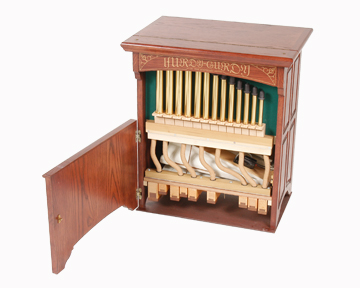

Organ Supply Industries, of Erie, PA,
produced this small hand-cranked 20 note organ. "Strasse
Orgel" is German for "street organ." OSI also referred to them
as "Strassen Orgel" in some documents.
This page contains a basic description of the organs. The following pages provide additional information:
Most of these organs were sold as part of the
cart for Hurdy-Gurdy Italian Ice franchises.
Only a small number of the Strasse Orgels were sold directly
to the public by OSI. Two groups of organs were sold as part
of the franchise, about 60 Hofbauer 20 note Mikro organs and
about the same number of organs produced by OSI. The franchise
organs will have the words "Hurdy-Gurdy" on their faces, as
will a few of the privately sold ones. The owners of these
organs have only recently gained access to the real history of
the OSI Strasse Orgel and the "Hurdy-Gurdy" Hofbauers. Click here to learn the secrets!
The OSI Strasse Orgel is no longer available for
sale by OSI.
Orgelbaumeister Hofbauer continues to build a
variety of small organs at their factory in Göttingen Germany.
Their website is http://www.hofbauer-orgelbau.de
These web pages are being developed as a place where owners and or fans of these machines can exchange information, and as a way to provide some contacts between owners.
If you have an interest in these neat little musical instruments you may join the group by contacting me (Wally Venable) at wallace.venable@mail.wvu.edu
Include your Name, and Address, (and email address or website if you have them). If you own an Strasse Orgel, please tell me the name (if any) you have given the organ and the Serial Number. By joining the OSI Strasse Orgel Owners' Group you give me permission to provide your information to other group members.
The OSI Street Organs are tuned to the Carl Frei 20 note (German 20er) scale. This scale is used on many small modern crank organs, so it is also known as the "Standard 20 Note Scale," the "Raffin 20" scale and the "Smith Busker Organ" scale. There are other 20 note organ scales in use, particularly on older barrel organs such as the Gem Roller Organs.
The notes in this scale are:

You will note that there a lot of "missing notes." B, C#,
F# and G# do not occur in the scale at all.
EASE OF OPERATION
This organ was designed to be "user-friendly." To operate the organ, simply rotate the crank arm located at the rear of the case, fast or slow, in either direction. No more paper music rolls to rewind or wrinkle. Music was available on a plug-in type music card, from which musical selections can be picked at random or in sequence. Tempo is adjusted by a rotary dial.
TRADITIONAL WIND BLOWN PIPES
Turning the ergonomically correct hand crank drives a double wedge bellows and reservoir. This supplies wind through the electro-mechanical chest and into the 22 individually hand-crafted wood bass pipes and solid brass melody pipes. Each set of pipes is individually voiced for a full, rich sound.
ELECTRONIC MUSIC ROLL
OSI engineers have developed a music reading system to replace the old and clumsy perforated music rolls. Rather than encoding the music on rolls, it was encode it on a credit card-sized, plug-in memory module. Each module is capable of holding 100 songs, of which 25 are included at no charge with the purchase of a Street Organ. Expanding the musical library was possible with additional selections was possible with the purchase of additional cards. Included with each Street Organ was a 12 volt DC rechargeable battery and charger, which supplies continuous power to the electronics module for many hours of enjoyment.
OSI will not provide support for these small organs.
I have compiled spreadsheets of song lists for the three OSI Music Cards which we own. These are provided here in HTML format..
Our cards are:
Please send me additional information or corrections.